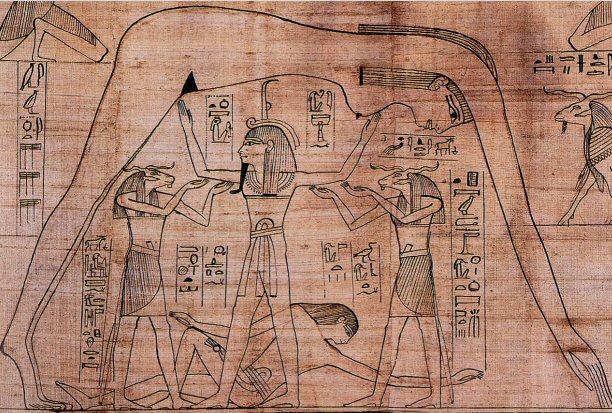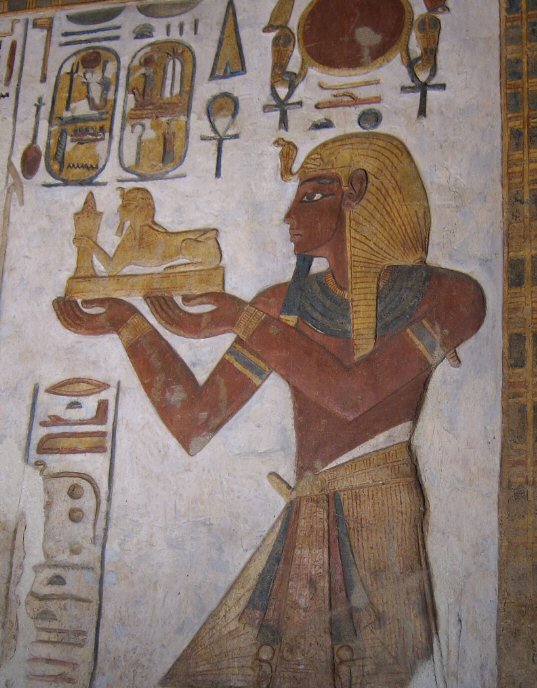Ancient Egyptian Religion And Myths
The ancient Egyptians had a complex religious system that combined aspects of personal/family deities, city gods, and a very small number of national deities. The best way to understand it is: every city had its local deity and that deity was the principal god for that local population. There was also the only true national god and that was the king. Again worship varied. There was individual prayer. There were community celebrations. There was worship and rituals within temples. Since the general populous could not go into the temples, there was no public worship in the temples. The major public worship ceremonies would be those where the god was carried out of the temple in a shrine and paraded around town for people to see and returned to the temple. Within temples an ordained/purified priesthood carried out the daily, monthly and seasonal rituals. Also, many of the deities in ancient Egypt were related to natural phenomenon and worship may have been developed as a respect for that (such asrepresentation of the Nile floods, appearance of certain stars, beginning of growing season, etc.). Christianity has recognized Sunday as the day of worship. Islam has Friday. Jews honor the Sabbath. Since the ancient Egyptians used a lunar calendar, all of their festival days are tied into lunar calendar dates. They also used a civil calendar and special national festivals were associated with the New Year time This varies immensely by god. Some of the more common rituals include waking, feeding, bathing, clothing, singing to, and putting the god to bed in the evening.
 These would have happened on a daily basis. Each temple would have had additional rituals during the month. Funerals seem to be times of transition for the deceased. They are passing from this life into the afterlife. The corpse and spirit are ritually brought to the tomb and a variety of rituals are performed to assist them in making the passage to the afterlife where they are reborn in the Egyptian version of paradise. The funerals include much weeping and wailing, but also include a festival meal and libations for the decease There afterlife was a place where they were reborn in the company of the gods. There afterlife was a place where they were reborn in the company of the gods. It mainly included all of what they held dear in this world and many others, especially cool breezes, good food, a nice place to live, etc. This is a most discussed question. We assume that everyone could make it to the afterlife, but the social position of the dead in the afterlife mirrored that of the resent world. If you were a commoner here, you will be a commoner there.
These would have happened on a daily basis. Each temple would have had additional rituals during the month. Funerals seem to be times of transition for the deceased. They are passing from this life into the afterlife. The corpse and spirit are ritually brought to the tomb and a variety of rituals are performed to assist them in making the passage to the afterlife where they are reborn in the Egyptian version of paradise. The funerals include much weeping and wailing, but also include a festival meal and libations for the decease There afterlife was a place where they were reborn in the company of the gods. There afterlife was a place where they were reborn in the company of the gods. It mainly included all of what they held dear in this world and many others, especially cool breezes, good food, a nice place to live, etc. This is a most discussed question. We assume that everyone could make it to the afterlife, but the social position of the dead in the afterlife mirrored that of the resent world. If you were a commoner here, you will be a commoner there.
 They did fear death, but also recognized it was mainly an area that they have not experienced and thus that can be a very daunting thing. Yes, they did both regular and burnt offerings. It was normal that the produce of fields owned by temples was offered to the gods. It normally happened that the priests were then given a portion of that as their salaries once the god had consumed that part which he/she wanted. What was buried with the deceased was entirely based upon their social / economic standing. Wealthier people had more stuff, poorer had less. Wealthier people normally had better tombs, nicer coffins, etc. It truly was a reflection of their current wealth. Not in the sense that some beliefs from India have the spirit reborn into a different or better physical form in this world. Rather we need to remember that their rebirth was confined to the afterlife. Pyramids were restricted to those who could afford them such as kings and queens. We do see in the New Kingdom (1500 - 1100 BC) private individuals begin to place mini-pyramids on the tops of their personal tombs, but again those individuals were wealthy and could afford that extravagance. The gods were in charge of maintaining the world. Thus the king did his job of maintaining the country in good order and the gods rewarded him with a long reign (or so the theory goes). People worships the gods because the world belonged to them and if people disrupted the world, the gods could remove their protection over the people. It was definitely a system where the gods had the upper hand so to speak.
They did fear death, but also recognized it was mainly an area that they have not experienced and thus that can be a very daunting thing. Yes, they did both regular and burnt offerings. It was normal that the produce of fields owned by temples was offered to the gods. It normally happened that the priests were then given a portion of that as their salaries once the god had consumed that part which he/she wanted. What was buried with the deceased was entirely based upon their social / economic standing. Wealthier people had more stuff, poorer had less. Wealthier people normally had better tombs, nicer coffins, etc. It truly was a reflection of their current wealth. Not in the sense that some beliefs from India have the spirit reborn into a different or better physical form in this world. Rather we need to remember that their rebirth was confined to the afterlife. Pyramids were restricted to those who could afford them such as kings and queens. We do see in the New Kingdom (1500 - 1100 BC) private individuals begin to place mini-pyramids on the tops of their personal tombs, but again those individuals were wealthy and could afford that extravagance. The gods were in charge of maintaining the world. Thus the king did his job of maintaining the country in good order and the gods rewarded him with a long reign (or so the theory goes). People worships the gods because the world belonged to them and if people disrupted the world, the gods could remove their protection over the people. It was definitely a system where the gods had the upper hand so to speak.
Most of the Egyptian myths are motivated by the ancient Egyptian desire to know the origin of the universe. These myths were depicting the Ancient Egyptian culture and usually contain elements such as the Lotus Flower, the mysteries of nature, the daily renewal, and the revival of the soul-and politics. These ancient Egyptian myths are still admired by people from various countries and culture, thus they are used in many literary works such as Bob Dylan's song Isis to support their success. Tourists are always fascinated with the ancient Egyptian myths of Thuth, Anubis, and Bess. This fame makes many companies in Egypt and all over the world use their names and faces as a means for attracting people.
Ancient Egyptian Belief in Resurrection
The Ancient Egyptians believed that the mummy housed the soul and spirit. Their belief was often thought of as complex and involved three spirits: the Ka, Ba, and Akh. The Ka was the essence of the person, like their double, and it remained in the tomb and made use of the offerings and objects there. The Ba was free to move around, inside or outside of the tomb. The Akh traveled throughout the Underworld and to the entrance of the Afterlife. There are three inhabitants of the Afterlife: the dead, the gods, and the Akh. When the person dies, the Ba and the Ka are separated from the body, but they do not die. Instead, they get released through ritual into the next world. The goal in the Underworld was to live in one's Ka, which holds the physical resemblance to the deceased. In order to do this, the Ba and the Ka must overcome the dangers of the Underworld and reunite to form the Akh. The Akh will then have made a successful transition to the Underworld and will live with the gods. Those who fail to make the connection are called the dead, and they have no hope of ever living a renewed life.
More about Ancient Egyptian Religion And Myths
Anubis, The God of Mumification and the Hereafter
Anubis is one of immortal gods in the ancient Egyptian mythology whose importance is attributed to his great role in the underworld as the protector...+
Read MoreDeath Rituals - the Funeral Procession in Ancient Egypt
The Funeral procession was an element of the death rituals in Ancient Egypt. After 70 days following the death of a person, an elaborate funeral pro...+
Read MoreBurial Customs in Ancient Egypt and Their Development
Pyramids, temples, tombs, the burials of kings, nobles and the common people, all express the unique Ancient Egyptian idea of death. Ancient Egyptians...+
Read MoreHapi, The Nile God
Hapi in the ancient Egyptian mythology is the god of the Nile River and the source of life of all the people, animals and plants around it. The exce...+
Read MoreIntroduction to Mummification
Blessed with a long, rich history as well as countless marvels and wonders, the Land of the Pharaohs always reveals bewildering mysteries. Huge volu...+
Read MoreHorus, The King of The Earth
Horus is one of the prominent and most influential gods in the ancient Egyptian mythology and the hero of several myths. The priests of Ra placed Ho...+
Read MoreLotus Flower Myth
According to the ancient Egyptian Myth of Creation, before life the whole world was nothing but a wide dismal sea until the Lummous Lotus Flower cam...+
Read MoreMaat, The Goddess of Justice
Maat is one of the goddesses in the ancient Egyptian mythology that was regarded as a symbol for wisdom and justice and other moral values that help...+
Read MoreThe Ennead of Heliopolis
The Ennead is a group of nine gods and goddesses in the Egyptian mythology topped by Ra, the Chief sun god. Before life, the whole universe was nothin...+
Read MoreRa, the Father of Kings
This myth was used to serve a crucial political purpose which id the desire of the members of the 5th dynasty and the members of the family...+
Read MoreThe Secret Name of Ra
Ra in the ancient Egyptian mythology was the sun god and the father of all the other gods and goddesses who grow older and weaker in his dec...+
Read MoreThe Sun-God and the Phoenix
The Phoenix is a mythical bird that was always pictured in the ancient Egyptian mythology as a handsome bird with two long legs, two feather...+
Read MoreThe God Khnum
Khnum is one of the ancient Egyptian gods who had been worshiped many years before the Pyramid Texts and was worshiped many centuries after...+
Read MoreThe Goddess Hathor
Hathor in the ancient Egyptian religion was presented as the Earth mother who was called in the Coffin Text "the Primeval or the Lady of A...+
Read MoreGoddess Hathor and the Destruction of the Mankind
One of the most interesting myths about Ra in his declining years is the myth of Hathor as the daughter of Ra and his weapon that he used fo...+
Read MoreThe God Thuth
Despite of his indispensable role in the ancient Egyptian mythology, Thuth has never occupied the position of one of the members of the di...+
Read MoreThe God of Fertility, Min
Min was the god of fertility in the ancient Egyptian mythology that had been deified in several centers throughout Egypt including Koptos and Panopoli...+
Read MoreThe Sacred Family of Abidos
In the ancient Egyptian mythology, Osiris was the Chief Judge of the dead in the under world, the husband of Isis and the father of Horus th...+
Read MoreThe Triad of Memphis
Built by the kings of the First Dynasty, Memphis had been the capital city of Egypt around 3000 BC, after the unification of Upper and Low...+
Read MoreThe Triad of Thebes
During the Middle Kingdom, (2133-1786 B.C), Thebes was regarded as the center of the political and religious affairs in Egypt and the cent...+
Read More





